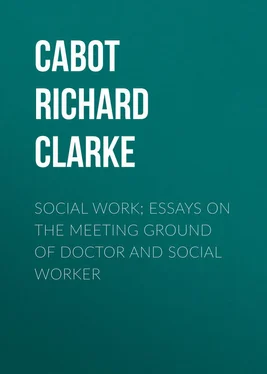Richard Cabot - Social Work; Essays on the Meeting Ground of Doctor and Social Worker
Здесь есть возможность читать онлайн «Richard Cabot - Social Work; Essays on the Meeting Ground of Doctor and Social Worker» — ознакомительный отрывок электронной книги совершенно бесплатно, а после прочтения отрывка купить полную версию. В некоторых случаях можно слушать аудио, скачать через торрент в формате fb2 и присутствует краткое содержание. Жанр: foreign_antique, foreign_prose, на английском языке. Описание произведения, (предисловие) а так же отзывы посетителей доступны на портале библиотеки ЛибКат.
- Название:Social Work; Essays on the Meeting Ground of Doctor and Social Worker
- Автор:
- Жанр:
- Год:неизвестен
- ISBN:нет данных
- Рейтинг книги:3 / 5. Голосов: 1
-
Избранное:Добавить в избранное
- Отзывы:
-
Ваша оценка:
- 60
- 1
- 2
- 3
- 4
- 5
Social Work; Essays on the Meeting Ground of Doctor and Social Worker: краткое содержание, описание и аннотация
Предлагаем к чтению аннотацию, описание, краткое содержание или предисловие (зависит от того, что написал сам автор книги «Social Work; Essays on the Meeting Ground of Doctor and Social Worker»). Если вы не нашли необходимую информацию о книге — напишите в комментариях, мы постараемся отыскать её.
Social Work; Essays on the Meeting Ground of Doctor and Social Worker — читать онлайн ознакомительный отрывок
Ниже представлен текст книги, разбитый по страницам. Система сохранения места последней прочитанной страницы, позволяет с удобством читать онлайн бесплатно книгу «Social Work; Essays on the Meeting Ground of Doctor and Social Worker», без необходимости каждый раз заново искать на чём Вы остановились. Поставьте закладку, и сможете в любой момент перейти на страницу, на которой закончили чтение.
Интервал:
Закладка:
At the outset of a relationship which aims to be friendly, investigations which start with the assumption that there has been some moral fault or weakness in those whom we wish to help are even worse than financial inquiries. The instant that the social worker finds herself in the position of a moral critic, it becomes next to impossible that a friendly relation not hitherto established, shall be built up from the beginning. Late in the course of a friendship established long before, moral help, even moral criticism, may be welcome. But it cannot often or easily be one of the topics of conversation, one of the points of investigation, in the early stages of what we hope to make a friendly relation.
Everything stands or falls with this. We cannot even teach hygiene, we cannot even make medical principles clear unless we have succeeded to some extent, perhaps without any merit on our part, perhaps through extraordinary good fortune, in acquiring a genuine liking for the person whom we want to help. Once that is attained, we can work miracles. But if it is wholly lacking, we cannot count upon accomplishing the simplest interchange of accurate information; we cannot achieve the most elemental hygienic instruction.
But there is another signal advantage in the medical point of approach to a relationship which, as I have said, must be friendly in fact, not merely in name, if it is to succeed in any of its ulterior objects. When the social worker begins the difficult task of acquiring her influence in a family, she starts with a great deal in her favor if she appears in the home as the agent of the physician . He has prestige. By reason of his profession, by reason of the institution which he represents, by reason of confidence already established by him in the patients' friends and neighbors, the new family is ready to have confidence in him. He is not thought to have any axe to grind. He is assumed to be genuine in his desire of helpfulness. Therefore any one who appears in his name, as his assistant, has a great deal in her favor, especially when compared with the visitors of societies which might be supposed to begin with economic or moral suspicions about the family. If the visitor appears in the home with the prestige of a medical institution enhancing the value of her own personality, she has a very definite advantage.
I have said that it is essential to the success of a medical visitor's work that she should be part of the medical machine, acknowledged as the doctor's agent, concerned wholly with helping to carry out his plans. But we must ask now, what part ? And the answer is that the social worker is an assistant to the physician both in diagnosis and in treatment . I will begin with an account of what she is to do as his assistant in diagnosis.
She is to discover, so far as she can, what the disease is, how much the disease is, and why it is. I do not mean, of course, that she is to ape the doctor's scientific investigations, that she is to use instruments of precision, or to try to prescribe medicines. But she is to help the physician in some of the following ways:
He is often very much at a loss to be sure how bad the patient's symptoms really are, how much the patient suffers, how serious the case is. The social worker is often able to help in discovering why the patient really came to the dispensary, discovering, perhaps, that the reason is such as to show that the malady is really a trifling one. She may find, for instance, that the patient has come merely because her husband had to come, anyway, and she thought she would get the benefit of whatever there was to be had in the way of medical assistance at the dispensary, even though, unless her husband had been going, anyway, it would not have occurred to her to make the independent visit upon her own account. Or, again, the visit may be due chiefly to curiosity, especially if the dispensary has been newly established or has added some new features to its methods of diagnosis and treatment. These facts are passed along from person to person; the person hearing of them may appear as a patient chiefly to see just what it is that her neighbors are getting when they go to the dispensary. I have known a patient to come merely because he was alarmed as a result of a recent conversation with a friend. His friend had been hearing about heart trouble and had mentioned some symptoms such as pain about the heart or cold extremities or dizziness. Any one sick or well on hearing such symptoms may easily remember that he has had them himself not long ago, or may even begin to feel them as a result of suggestion. Straightway, perhaps, he will betake himself to the dispensary, complaining of symptoms which never would have been noticed but for his talk with the friend.
Or, again, the patient may have some definite organic disease or some obstinate train of discomforts and physical inconveniences. But he has adapted himself to them tolerably; he has settled down to bear or forget them as best he may. He may know that his troubles are really incurable and yet not serious. He may have become as accustomed to them as he is to an uncomfortable lodging or to a modest income. Yet, as a result of some temporary fatigue, some newspaper paragraph, some fragment of gossip overheard, there may arise in him a crisis of alarm and worry about his familiar discomforts or inconveniences. Thereupon he may betake himself to a dispensary, and give the physician an account which may be very difficult to interpret, because the physician does not understand the train of events which appear acute and new in that they have led the patient just now, rather than at any earlier time, to seek advice. After nearly twenty years' experience of dispensary work I should say that in no respect can a social worker give the doctor more welcome help than by discovering now and then reasons such as I have just suggested whereby the patient comes to the dispensary now rather than at any other time, and at a season not really connected in any special way with the nature of his disease.
Perhaps I can make this clearer by contrast with its opposite. A person who has just developed a scarlatinal rash, who has just coughed and raised a considerable quantity of blood, who has just lost the power to move half of his body, who has just begun to have swelling of the face, naturally consults a doctor at once. If he then comes to a dispensary for treatment, he has come at a time which is the right time, the reasonable time, considering the nature of his malady. Something new has happened. An attack has been made which should be foiled if possible at once. The clue for usefulness on the part of the doctor is thus fairly clear. If, on the other hand, a person has had more or less back-ache all his life, and has grown used to getting along and doing his work, even enjoying life in spite of it, he may suddenly come to a dispensary for that back-ache because he has seen in the newspaper the wholly false statement that pain in the back means kidney trouble. Yet when he comes to the dispensary he may say nothing whatever about his having seen this newspaper advertisement . Indeed, it is very unlikely that he will mention this at all. He will describe his back-ache as something which demands immediate treatment, and the doctor may set in motion extensive and probably useless activities of investigation or treatment which never would have been undertaken had he known just what it was that brought the patient to the dispensary that day rather than months earlier or later.
So far I have spoken only of cases in which the visitor's studies in the home make it clear that the case is not as bad or not as manageable as it might have seemed if one had known only what the patient himself could reveal in the dispensary. But occasionally on reaching the patient's home the visitor may find reason to believe that the symptoms are much more serious, the disease much more urgent, than could have been realized from the story told and the facts obtained at the dispensary. The visitor may find in the home conditions of disorganization, dirt, disorder, serious malnutrition, discouragement on the part of other members of the family, arguing a much more serious condition of the patient than one would have realized from talking with him at the dispensary. As a result of such findings the doctor, who must spend his energies for the patients who need him most, will see that he had better give more time and more effort to the patient than he would otherwise have thought right.
Читать дальшеИнтервал:
Закладка:
Похожие книги на «Social Work; Essays on the Meeting Ground of Doctor and Social Worker»
Представляем Вашему вниманию похожие книги на «Social Work; Essays on the Meeting Ground of Doctor and Social Worker» списком для выбора. Мы отобрали схожую по названию и смыслу литературу в надежде предоставить читателям больше вариантов отыскать новые, интересные, ещё непрочитанные произведения.
Обсуждение, отзывы о книге «Social Work; Essays on the Meeting Ground of Doctor and Social Worker» и просто собственные мнения читателей. Оставьте ваши комментарии, напишите, что Вы думаете о произведении, его смысле или главных героях. Укажите что конкретно понравилось, а что нет, и почему Вы так считаете.












